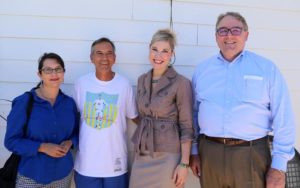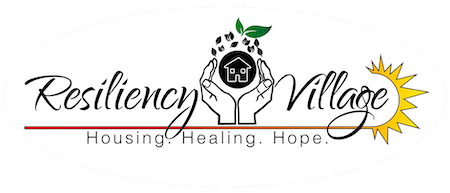Republished from Sonora Union Democrat

Mother Lode Job Training, based in Sonora, has been awarded $250,000 in state grant funding to help more than 40 residents of the Resiliency Village program — for individuals trying to transition out of homelessness — to prepare for and secure quality jobs with self-sustaining wages of $18 an hour minimum.
Karen Moore’s last job was driving for Courtesy Cab in Sonora and, even though she was employed, she ended up homeless for about a month in late 2020 and early 2021 because she couldn’t find an affordable place to live.
“I had a job, I had money, I just couldn’t find a place to rent,” Moore, 56, said Wednesday at Resiliency Village.
Moore recently earned associate degrees in accounting and business administration at Columbia College. She said she hopes to get back to work soon in an office job.
Chris Smith’s last job was cooking at the Twain Harte Golf Bar and Grill, he can make “a mean burger,” and although he’d been homeless more than a dozen years before connecting with Resiliency Village in January 2021, he said he will soon be ready to rejoin the local workforce so that he can take care of his 6-year-old daughter, who is currently living with her maternal grandmother.
“That’s my motivation to get back to work, 100 percent,” Smith said. “I’m also going to school, earning my GED through adult education up here. I’ll be ready for jobs in cooking and construction.”
Smith said he is doing all his general equivalency diploma studies on-site at Resiliency Village with the help and guidance of instructors at the nonprofit program near the end of Jenny Lind Road off Big Hill Road.
Moore and Smith are among the 46 Resiliency Village residents who now have the opportunity to benefit from the $250,000 in state grant funding. That works out to about $5,000 per individual that can be invested in services including trauma resolution counseling, personalized employment plans, work-readiness skills training, and specialized training for specific jobs.
Mother Lode Job Training of Sonora, also known as MLJT, is a federal Workforce Innovation and Opportunity Act Title I-financially assisted program with offices on Mono Way above Restano Way.
When it comes to individuals who have recently faced homelessness, trauma resolution is key to laying foundations for success, confidence, and — especially — dignity as they seek to join or rejoin the workforce, according to Mark Dyken, executive director for Resiliency Village, Emily Graham, planning manager for MLJT, and Amy Frost, deputy director for MLJT
“This new funding will give people the opportunity to attain the level of dignity that comes with having a job and working,” Dyken said. “In some cases it might be the first-ever job for an individual, and in many cases individuals will be returning to the workforce, after going through the significant traumas of homelessness.”
Resolving trauma for prospective workers is an ongoing process, not a week-long or a month-long thing, because a key catalyst in the process is actually being employed, earning a regular paycheck, gaining fulfillment, accomplishing goals, and reidentifying themselves, Graham and Frost said.
“That’s what we do here at Resiliency Village, trauma resolution,” Dyken said.
Trauma resolution opens the door for personalized employment plans, work-readiness skills training, specialized training for specific jobs, and gaining work experience, Thoeny said.
Graham and Frost have identified five work sectors where there is demand for workers, especially in the post-pandemic economy, in which 47 million workers quit their jobs in 2021 alone, according to the nonprofit U.S. Chamber of Commerce.
• Natural resources training is available for future foresters, firefighters, and water treatment and water distribution workers who could work for Tuolumne Utilities District, Twain Harte Community Services District, Jamestown Sanitary District, Hetch Hetchy and East Bay MUD, Frost said.
• Training in construction is available to prepare individuals for employment as skilled and unskilled laborers, carpenters, electricians, plumbers, drivers, and heavy equipment operators, Graham and Frost said.
• Health and human services training is available for prospective case workers, drug-and-alcohol abuse counselors, receptionists, peer support workers, caretakers, certified nursing assistants, and patient services specialists, Frost said.
• Training for truck drivers — a seven-week-long course — and dispatching is available for jobs in the logistics sector, Graham said.
• In the hospitality and culinary sector, training is available for cooks, servers, and security, Graham said.
Tuolumne County government currently has around 120 job vacancies, and while MLJT is not training individuals specifically for county jobs, MLJT is helping individuals prepare with skills that could help them qualify for some county jobs, Graham said.
The U.S. Chamber of Commerce says the COVID-19 pandemic caused such a major disruption in America’s labor force that many people have been referring to it as “The Great Resignation.” It may be more accurate to call it “The Great Reshuffle” because hiring rates have actually outpaced quit rates since November 2020. Many workers have been quitting jobs to get rehired elsewhere.
Transportation, health care and social assistance, and accommodation and food sectors have had the highest numbers of job openings since November 2020, the U.S. Chamber of Commerce said in a March article headlined “Understanding America’s Labor Shortage: The Most Impacted Industries.”
Earlier this month, the Washington Post reported the seven employers most desperate for workers so far this year have included sawmills and textile mills, and worker shortages in the categories of specialized long-haul truckers, movers, specialty finishing contractors, mental health practitioners, and veterinarians.
Regardless of the current labor market and which sectors have worker shortages, Resiliency Village residents need extra help to transition from their recent experiences of homelessness back to becoming self-reliant, productive, working members of the community.
Mother Lode Job Training and Resiliency Village are calling their new program Project REBOOT — for Return to Employment and Bold Opportunities Outside Trauma — and the program is expected to run through December 2023.
“We are excited to partner with MLJT on a project that can help rebuild lives and move people toward self-sufficiency,” Dyken said in an announcement distributed by Mother Lode Job Training this week. “The dignity of meaningful employment is an important component in reaching the goal of stable housing. Community partnerships are vital to the success of non-profit work, and we are grateful for this opportunity.”
The stated mission of Resiliency Village is to improve life for unsheltered and otherwise traumatized individuals. Resiliency Village aims to provide fundamental on-site services, including therapies, skills building exercises, modeling healthy lifestyles, and supporting opportunities for individuals to attain self-sustaining futures through “housing, healing, and hope.”
Since 1983, Mother Lode Job Training has provided no-cost workforce development services for job seekers and employers at job centers in Amador, Calaveras, Mariposa, and Tuolumne counties.
For more information about Mother Lode Job Training call MLJT at (209) 533-3396 or visit www.mljt.org online. Mother Lode Job Training is at 197 Mono Way Suite B, Sonora.
Article by Guy McCarthy at gmccarthy@uniondemocrat.net or (209) 770-0405. Follow him on Twitter at @GuyMcCarthy.
